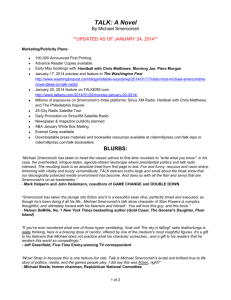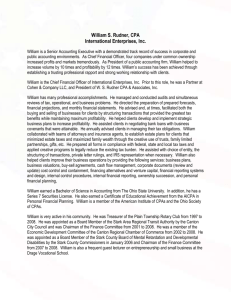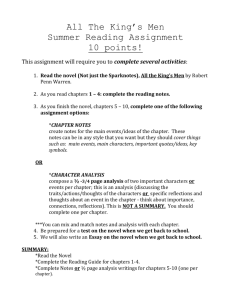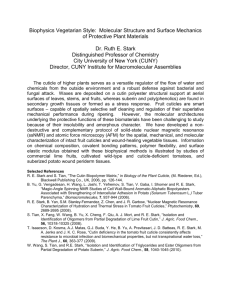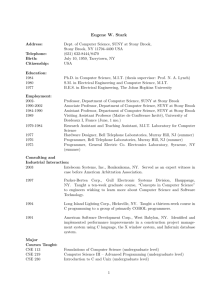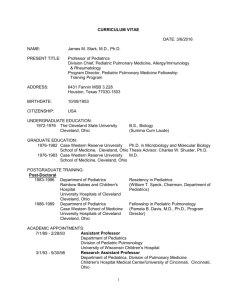All The King`s Men - California State University, Bakersfield
advertisement
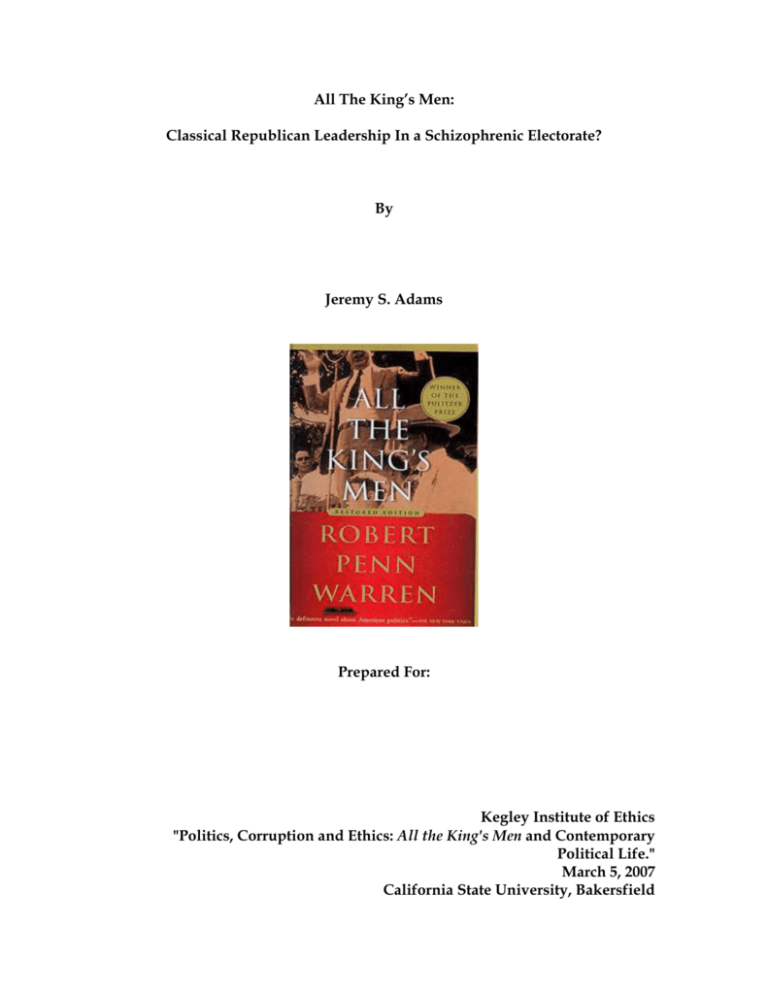
All The King’s Men: Classical Republican Leadership In a Schizophrenic Electorate? By Jeremy S. Adams Prepared For: Kegley Institute of Ethics "Politics, Corruption and Ethics: All the King's Men and Contemporary Political Life." March 5, 2007 California State University, Bakersfield I am honored and grateful to have been asked to be a member of this panel because it has afforded me the opportunity to think and to write about two of my passions: literature and politics. While reading Robert Penn Warren’s All the King’s Men I was reminded of what literary critic Mark Edmundson once said about reading a much-loved book: “Taking deep delight in a book or an author,” he argues, “is a little like falling in love. There is a nearly rapturous acceptance of all the author brings. The truth unfolds as if from above. But to adapt that vision to one’s own uses, to bring it wisely into the world, more than love is necessary.”1 I agree with Edmundson, but would add that when reading a novel as dense and sclerotic as All The King’s Men, the virtue that is needed from the reader is not love, but judiciousness. All The King’s Men is a novel that is pregnant with a cross-current of weighty and substantive issues ranging from the nature of culpability and history to the universalism of power and corruption. But the unifying thread of these eclectic themes is that they are all yoked together by a consideration of how they affect the American notion of genuine leadership and the role individual actors can play in the grandest narrative of all; that of Human History. It is no coincidence that when Willie Stark speaks as a simple candidate, telling voters the dry facts of what they need, his candidacy lacks any popular enthusiasm. As Stark says, “I have a speech here. It is a speech about what this state needs. But there’s no use telling you what this state needs. You are the state.”2 It is only when Stark heeds the advice of our narrator, Jack Burden, that his political viability comes to life. Jack counsels Willie by saying, “make ‘em cry, make ‘em laugh, make ‘em think you’re their weak erring pal, or make ‘em think you are God Almighty. It’s up to you to give ‘em something to stir ‘em up and make ‘em feel alive again. That’s what they come for. But for Sweet Jesus’ sake don’t try to improve their minds.”3 It is interesting to note that the cool, rational and deliberate Willie Stark who extols the virtues of “decent government” fails to excite the passions or interest of the people.4 But when he calls his audience names, calls himself a redneck, and enlivens the rhetoric of nailing someone to the cross, he commands the attention of the voters.5 This begs a central question of the novel and of American political discourse itself: do voters prefer charisma or competence? If nothing else, All the King’s Men is a meditation on the interplay between the two. A survey of the political landscape today confirms the same conflicting dynamic that we see in Robert Penn Warren’s Willie Stark. 1 Edmundson, pg. 94 Warren, pg. 135 3 Ibid., pg. 108 4 Ibid., pg. 118 5 Ibid., pg 142 2 2 Indeed, our brief discussion of Willie Stark naturally leads to a number of pivotal questions about the political culture of today: Do we want a leader who feels our pain but takes a poll before taking a stance, thus replacing classical republican principals of governance with a kind of watered-down pollocracy? Do we want leaders who are firm in their political convictions, a leader who takes a Churchillian stand from the hallowed ground of historical judgment instead of bowing to the transitory winds of editorial boards across the country, yet at the same time seems obstinate and indifferent to mass opinion? We Americans are a tough, even schizophrenic brood. We want every entitlement without the taxes or deficits to finance them. We want to promote democracy and give a viable alternative for moderate regimes in the Middle East fighting clerical barbarism yet we don’t want a protracted battle or an alienating foreign policy. We want to solve global warming but we don’t want to suffer the economic consequences to do it. How can any aspiring leader successfully brave these storms of a seemingly bipolar citizenry? Or as John Stuart Mill framed the issue: “To get good government means to get consent to good governors, and this is the political problem.”6 What traits of leadership are desired, even required, by such an individual? Do the McCains, Clintons, Obamas, and Gulianis of this country possess the duality of “the vision thing,” but also the competence of a tenured office holder? We want our leaders to be part philosopher-king, part pragmatic practitioner. We want the same leader to stand on principle but also to get things done in a divided country. Indeed, the list of superlatives and sources to describe the desired qualities of an American leader are virtually limitless. Do we consult the Federalist Papers in which Hamilton tells us that “ambition is the ruling passion of the most noble minds” and the natural aristocracy only includes those with a “continental reputation?”7 Do we heed the words of Edmund Burke who argued that genuine leadership consisted in giving constituents “the clearest conviction of his judgment and conscience“ and that a representative must act for the good of the nation instead of the narrow interests of his district?8 John F. Kennedy echoes this sentiment in Profiles in Courage, “The voters selected us, in short,” he says, “because they had confidence in our judgment and our ability to exercise that judgment from a position where we could best determine their own best interests, as a part of the nation’s interests. This may mean that we must on occasion lead, inform, correct and sometimes even ignore constituent opinion, if we are to exercise fully that judgment for which we were elected.”9 Should we adopt a Jacksonian model of leadership 6 Mill, pg. 247 Hamilton et al, Federalist 72/Federalist 68 8 Burke, Speech to the Electors of Bristol 9 Kennedy, pg. 16 7 3 which asserts that the president is merely a human tribunal of public sentiment? What of Willie Stark’s demagogic tyranny?10 However you answer these questions – competence or charisma, Burke or Jackson, the vox populi or the natural aristocracy -- it has become fashionable, even a little bit of a cliché and frankly annoying to this government teacher and sometimes political science professor, to say that every politician is corrupt and that the politics of compromise always trumps the politics of principle. Some commentators have even argued that although the story of Willie Stark is particular in its narrative, it is universal in its theme of power propagating corruption. I understand the frustration of the status quo -- there is no shortage of government failure and corruption in recent years from the occupation of Iraq to the malfeasance of solving American’s long-standing problem of future unfunded liabilities in Social Security and Medicare. Indeed, a perusal of recent books about leadership and the legislative process yields cynical titles such as Why Americans Hate Politics, Democracy on Trial, The Trouble with Government, Slouching Towards Gomorrah, and my personal favorite, Demosclerosis.11 . The fact of the matter is that many of us don’t trust our government or the leaders that run it. As de Tocqueville tells us, “Men living in democratic ages do not readily comprehend the utility of forms: they feel an instinctive contempt for them.”12 The low approval rating of Congress is constant. The percentage of voters who trust government to do the right thing has been on a steady descent since the late 1960’s, this despite the fact that the entitlement menu continues to expand. Depending on who you talk to there are any number reasons for the distrust: the advent of investigative journalism and the constant carousal of Washington scandal, the prominence of interest-group politics in the deliberative process, pandering to the poll of the moment, politicking to the highest bidder, and, of course, engaging in a kind of sadistic sophistry in which the brutal truth of an issue – be it Social Security, Iraq, or education reform -- is softened by the rhetoric of the 10-second sound bite. Why is the question of leadership so central to the story of All The King’s Men? Because, as political philosopher Eduardo Velasquez tells us, “We are creatures who learn by example, and are thus improved or depraved by the models before us.”13 Leadership plays a decisive role because – for better of for worse – the narrator, Jack Burden, realizes that individuals matter and that we are all somehow connected to such a thing as ‘greater schemes.’ We do not live our lives in isolation from each other or divorced from the consequences of what we 10 Lane, pg. 812 Zakaria, pg. 164 12 De Tocqueville, pg. 325 13 Velasquez, pg. 216 11 4 do and what we say. Jack’s Great Twitch Theory from earlier in the story fails to recognize the truth of our interconnectedness and is a form of watered-down, reverse solipsism of the worse kind: not only are Time and History impersonal cosmic forces beyond individual manipulation, Jack’s theory holds, but personal culpability and meaning become impossible in such a barren world-view. “Jack follows Stark’s combination of materialism and democracy to what appears to be a logical conclusion in nihilism and falls into the malaise of the human spirit that Nietzsche characterizes as the mark of the last man.”14 Jack fortunately comes to reject such a world-view because he eventually understands that history is not the inevitable force he took it to be. It is no coincidence that Warren uses a quote from Dante’s Purgatorio in the epigraph of the novel. We are neither in heaven nor hell, and while this world – especially the arena of politics -- might be inhabited by fallen creatures, that doesn’t mean the aim of perfectibility is folly. Words and ideas – if properly harnessed with the passion of principle and relayed by the audacity of grandiloquence – are agents of action and change. And because individuals can and should matter, it is important to consider the proper traits of the individuals making the defining decisions of our generation. And while it is vogue and perhaps a little fashionable to berate the political class of the status quo as being uninspired or unprincipled or even incompetent, it must be noted that in a democracy we truly get the leaders and the government we deserve. If we didn’t, then we would be slouching towards an oligarchy. Instead, we should ask ourselves what we want as a civilization and what it will take to get it. The truth is that in a democracy, hatred of our leaders is a form of plebiscitary self-loathing. If individual actors and ideas do matter on the grand stage of Human History, then we must move beyond the comfortable lexicon of rights and talk about responsibilities. We must cherish duty as much as we do entitlements. We must renew the covenant of citizenship under the banner of contribution instead of restitution, truth as the purpose of toleration, and liberty as a vehicle for living lives of purpose and meaning instead picking from the fruitless tress of adulation and accumulation. Why? Because a singular voice can become a chorus. A chorus can become a cause. A cause can be the catalyst for putting civility back into civilization. As Robert Penn Warren said to The Paris Review in 1956: “America is unique among nations because other nations are accidents of geography or race, but America is based on an idea.”15 All The King’s Men is indeed a novel, but the reading of it is also an opportunity for all of us here to reflect and abstract about the idea of America. The reading of this novel is an occasion to remember that history is not static but 14 15 Lane, pg. 824 Paris Review, pg. 7 5 fluid, and that our time to redirect the waters of our civilization is now. It is my belief that in recent years what was once a healthy skepticism about government and its functions has eroded into a corrosive cynicism that saps the zeal from the democratic process. Just as the narrator, Jack Burden, once believed that no individual is responsible for the results of his actions, so too do many modern Americans find it acceptable to complain from afar about their political system without allowing their votes or voices to be heard, never realizing that their apathy, cynicism, and political indifference has its own consequences. And that each of us – in his own time and in his own way – bears a burden for the society that flourishes around us. For those that disagree I close with a simple question: Does America feel lucky? 6




